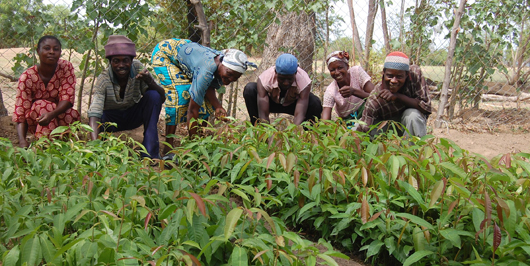Africa: UK Government shows ongoing commitment to African agriculture
03.12.09
As the Copenhagen Climate Conference looms nearer, the scars left by a changing climate are being felt across the world.
Nowhere is this more true than the drylands of Africa where food security - multiplied by landscape conversion, grinding poverty, and bad governance - threatens this huge continent.
Tony Hill from Tree Aid - a UK charity who work on forestry focused development - firmly believes investment in agriculture is the key to unlocking a better future.
A recent debate by the House of Lords (19th November) highlighted the urgent need for food security in Africa. Lord Cameron and The Earl of Sandwich both emphasised the importance of investment in agriculture in Africa as a viable means of working towards alleviating poverty in a sustainable way,
Tree Aid has many years of experience supporting poor rural communities in Africa’s drylands. We work with small farmers, helping them to integrate trees and forests into their farming systems and make best use of tree products to support their livelihoods. Based on this experience, we support many of the arguments put forward in this debate.

Nursery attendants in Ghana
Smallholder agriculture is definitely part of the solution in Africa. Small farmers in arid lands are highly efficient. Relatively modest investments could help them to be even more productive. Such increases in productivity, especially for women producers, will bring major direct benefits in food security and a cascade of secondary benefits in health, education and economic empowerment.
A world with one billion malnourished men, women and children is indeed a scandal, to which the drastic fall in OECD (Organisation for Economic Co-operation and Development) investment and African government spending on agriculture has been a major contributing factor. Tree Aid is encouraged by the UK Government’s recognition of the need for good investment in agriculture and food security in Africa. We shall be even more pleased if this translates to increased investment in smallholder farming and agro-forestry production and if non-governmental organizations can contribute to ensuring this aid is effectively used.
Investment is needed in well targeted research and development to address the constraints and opportunities of small farmers. Certainly there is a need for training in appropriate technologies for soil and water management, which must include better management of trees in farmed landscapes. Micro-finance for enterprise development, market chain development and equitable access and control of land and forest resources are also critical.
Support in these areas will have a big impact on reducing poverty and vulnerability. Tree Aid would like to lend its support to the argument that "DfID must be in there helping to unlock this potential."
Related links:
Kenya IN PICTURES: Scenes of devastation from the Mau Forest
15.09.09
 A few days ago Plant Talk reported from the Mau Forest in Kenya as the Kenyan Government, in partnership with UNEP, appealed for funds to help save their largest forest. These photos show exactly why that appeal was made: this is forest degradation on a huge scale, threatening not only the plants and animals but also the human inhabitants.
A few days ago Plant Talk reported from the Mau Forest in Kenya as the Kenyan Government, in partnership with UNEP, appealed for funds to help save their largest forest. These photos show exactly why that appeal was made: this is forest degradation on a huge scale, threatening not only the plants and animals but also the human inhabitants.
Kenya: Appeal to save largest forest
10.09.09
 Kenya has launched an appeal to help save over 400,000 hectares of forest from further damage. The Mau Forest, which is Kenya’s largest forest system, lies to the north-west of Nairobi and has suffered from agricultural encroachment and illegal logging encouraged by state-led corruption.
Kenya has launched an appeal to help save over 400,000 hectares of forest from further damage. The Mau Forest, which is Kenya’s largest forest system, lies to the north-west of Nairobi and has suffered from agricultural encroachment and illegal logging encouraged by state-led corruption.
Trees changing attitudes and lives in Africa
28.06.09
 2009 is a critical year for forests and efforts to mitigate climate change could be strengthened if nations agree to protect the world's forests.
2009 is a critical year for forests and efforts to mitigate climate change could be strengthened if nations agree to protect the world's forests.